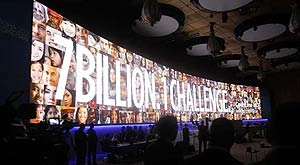Nations Urged to Take Action at Doha Meeting
China.org.cn, November 27, 2012 Adjust font size:
The UN Doha Climate Change Conference, held from Nov. 26 to Dec. 7, called delegates to take urgent action to avoid a global disaster in the next generation at the start of the conference.
The annual UN talks convened in Doha, Qatar, as more than 200 countries sit down to talking about how to address climate crisis.
Yet, experts forcast that the conference has little prospect of making a breakthrough over how to keep alive hopes of a new, global UN deal to fight climate change, but it will still play a crucial role in setting strategy for the key year of 2020.
South African Foreign Minister Maite Nkoana-Mashabane urged countries at the opening ceremony to act immediately, saying that "if we are to avoid a global catastrophe in the next generation. We cannot waver in our resolve to rise to this challenge."
Su Wei, China's chief climate negotiator and director of the department of climate change at the National Development and Reform Commission, urged developed economies to take a leading role with bold action, in a speech on behalf of Brazil, India, South Africa and China at the plenary meeting.
"We urge developed economies to honor their commitments to reduce emissions and provide adequate financial and technical support to enable developing economies to take action on combating climate change," Su said.
The conference was convened in the wake of a string of natural disasters, such as Hurricane Sandy which smashed into the United States and Haiti. But countries differ on their approaches to that goal.
The conference will center on the extension of the Kyoto Protocol, the only legally binding global treaty that mandates reduction in emissions, after it expires at the end of this year, and making arrangements for a new global climate treaty that includes all countries to go into effect in 2020.
The principle of common but differentiated responsibilities that was reaffirmed at the UN's Rio+20 summit this summer in Rio de Janeiro, Brazil, was repeatedly highlighted at the opening ceremony.
Developing nations have taken determined action to cut emissions at substantial cost to their economies and their contribution is much greater than that by developed countries, Su said.
"The Kyoto Protocol remains the key component and cornerstone of international efforts to fight climate change and the adoption of its second commitment period, through a ratified amendment implemented from Jan 1, 2013, is the priority for Doha."
In addition, developed countries should ensure implementation of their financing commitments, he said.
He also welcomed the launch of a new working group, agreed last year in Durban.
The group, known as BASIC, sees Brazil, South Africa, India and China working together to combat global warming. They also want the Doha meeting to be conducted in an open, transparent and inclusive manner.
"A careful and delicately balanced package was reached in Durban. We underscore that the full and effective implementation of that in a balanced and comprehensive manner, is essential to the success of Doha," Su said.
Li Yan, Greenpeace East Asia climate and energy campaign manager, said obligations and commitments were repeated again and again and it seems they have lost their appeal, but in Doha, the previous commitments must be implemented.
It is the first time a Gulf nation hosted the annual UN climate talks. Qatar faces food and water vulnerabilities, and it is one of the 10 developing countries predicted to be most affected by rising sea levels.
Christiana Figueres, executive secretary of the United Nations Framework Convention on Climate Change, urged negotiators to allow documents to be finalized in an open and transparent manner.
Much can be accomplished before the high-level panel meets (in the second week of the conference), she said and this might allow an early and united end to the conference.


